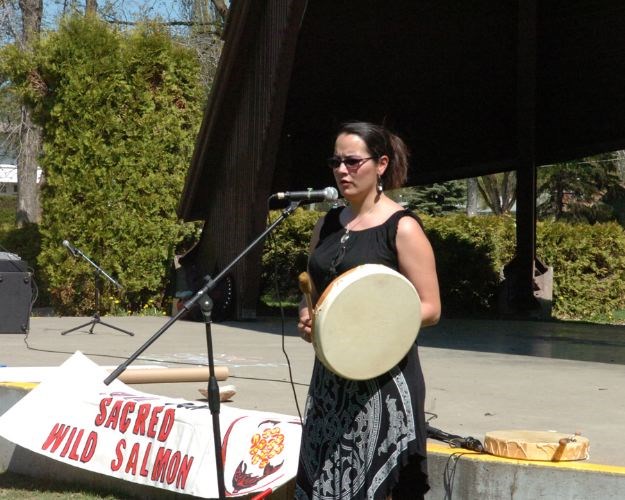When Jennifer Pighin was a little girl, she was always fishing. She would walk along the Nechako River and stare as the salmon moved in groups.
"I used to be able to stand on the shore and count salmon going up: 10, 15, 20, or 25, count them in batches of four or five, just swimming together, you could see them," said Pighin Sunday as the Wild Salmon Caravan launched an event that will travel from Prince George to English Bay in Vancouver.
"It's quite devastating to think back of how it used to be and how it is now," said Pighin, who is Lheidli T'enneh First Nation. "Salmon are really important to us."
On Sunday Pighin stood with the Khast'an drummers and sang in honour of water and listened as Tannis Reynolds, also a drummer, introduced her song:
"It's really important to remember our ways were the ways that the salmon were strong," Reynolds told the group of about 30 gathered at Fort George Park. "Our ways say you have to respect salmon and its habitat."
The caravan is a series of events, organized to follow salmon migration routes from the smolts swimming in the headwaters to the ocean. From Prince George, organizers have planned stops in Lillooet, Lytton, Yale, Fort Langley and Vancouver.
"The idea behind the caravan is to open the minds and hearts of more people on the importance of saving wild salmon from industrial harm," said Eddie Garner, who is an organizer of the St:l Nation, based in Chilliwack.
"The purpose is to celebrate the fact that we still have wild salmon to save although they're endangered," he said.
Carl Frederick, who works with the Lheidli T'enneh's fisheries program, spoke of mismanagement of fish stocks and the danger commercial fisheries present to wild salmon.
"Every year, every cycle is getting worse and worse," said Frederick, referencing the "dwindling stock within our territories past the confluence, past Shelly and it goes up into the Bowron River.
Last year, the run cycle had about 12,000 salmon which was up from the year before but a far cry from the 250,000 Frederick said used to be in the run.
"It used to be full of salmon, now we don't even fish it. It's just so bleak," Frederick said.
For caravan organizer Sabina Dennis, salmon is akin to survival for her people.
"Wild salmon has always been a staple of our people and a sacred ally of our people that's not only medicine: it's food, it's also a part of our spirituality and our upbringing is through the salmon," said Dennis, who is Nadleh and lives in Fort Fraser.
"It's as important to us now as it is to protect our own peoples' survival. It's very integrated with our culture. We coexist with salmon. Without them we'll fee lost."



